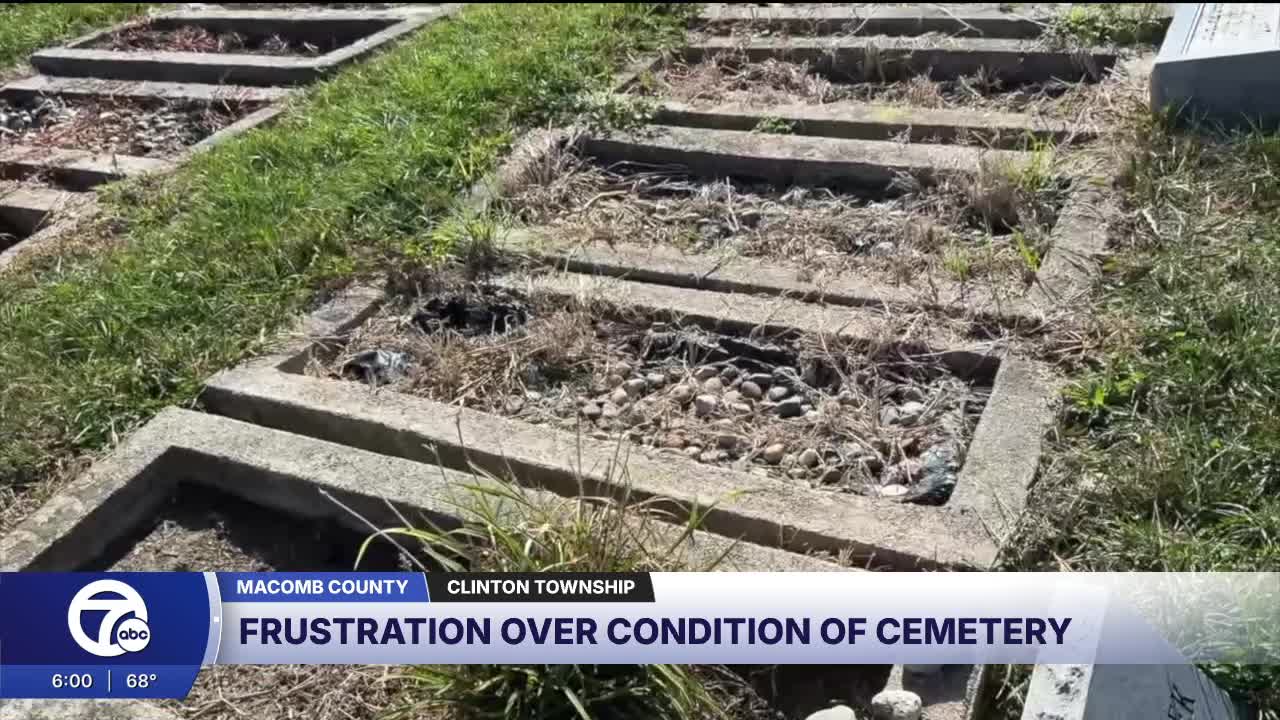CLINTON TOWNSHIP, Mich. (WXYZ) (WXYZ) — Loved ones with family members buried at Hebrew Memorial Park in Clinton Township are speaking out about the condition of the cemetery, with a change.org petition advocating to beautify the grounds reaching over 1,100 signatures.
The 50-acre cemetery — considered one of the largest Jewish cemeteries in the Midwest — contains nearly 30,000 graves and is nearly 100 years old.
Watch Evan Sery's video report below:
Darcee Matlen, who has about 100 family members buried at the cemetery and started the petition, says the children's portion is particularly concerning for grieving parents.
"They're already devastated. They lost their babies," Matlen said.

She describes each visit as worse than the last, particularly over the past decade.
"I would say in the past 10 years, it has gotten frighteningly to the point of no return where we're worried," Matlen said.
Families cite concerns about weeds growing out of gravesites, some as tall as the tombstones themselves, along with cement curbings and irrigation pipes that have become tripping hazards.

Matlen shared an example of accessibility issues affecting visitors.
"There was an older woman in the baby section that when she got too old to climb over it and wanted to see her baby, her daughter would go on FaceTime and show her the baby's grave," Matlen said.
Steven Gershman, who has a dozen loved ones buried at the cemetery and plans to be buried there himself, says visits are unpredictable.
"I'm always a little scared not knowing what I'm going to find," Gershman said.

He referenced Jewish law in explaining the family's concerns.
"Under Jewish law, we are told Kavod HaMet, honor the dead — that's all we're asking for, nothing more, nothing less," Gershman said.

In a statement to 7 News Detroit, Executive Director Rabbi Boruch Levin said Hebrew Memorial spends in excess of a million dollars a year at the 50-acre cemetery on weeding, planting, grass cutting, resurfacing roads, lifting fallen monuments and general maintenance.
Levin said landscaping is difficult because the founders of the cemetery created the cement curbings around each grave. As for the irrigation pipes being a trip hazard, he said it's impossible to place them underground due to the burials that have taken place.
The rabbi said leadership has met with the group requesting changes at the cemetery to address their issues, and other changes such as better signage were instituted. He said no one is turned away because of lack of funds and they will continue to be there for people.

However, families say they want more dialogue.
"We understand that it's a large cemetery, we understand they bury the indigent, but they do get the help of the state. We've heard all the reasons why not. We have the solutions. They're unwilling to meet with us — the board won't have an open forum," Matlen said.
For Gershman, the condition of the cemetery adds to the pain of loss.
"It's painful enough that you have to come to a grave and especially when you come to a grave that's unkept, which is like another dagger in someone's heart," Gershman said.

Rabbi Levin's full statement can be read here:
"Hebrew Memorial Park, a 50-acre cemetery, was established almost one hundred years ago as a traditional Jewish cemetery by a group of civic-minded people. This non-profit cemetery, which has 27,000 burials, continues to be the resting place for a large cross-section of our community. No one is turned away due to a lack of funds. Because cremations are prohibited by Jewish law, it is our mission to assist families with honorable burials who would otherwise choose cremation due to their lack of ability to afford a burial.
"Tradition tells us that graves should be respected and not stepped on, and as such the founders initiated large cement curbings around each grave. In the spirit of "to dust you shall return," no metal caskets or vaults are permitted at the cemetery. These restrictions, followed by only a few local cemeteries, understandably make landscaping much more difficult. The planted areas are large, the ground is sometimes uneven, and the equipment's maneuverability is hampered.
"As an accommodation to the people who want plantings on their loved ones' graves, our perpetual and annual care program has been available for many decades. Unlike most cemeteries, Hebrew Memorial does not obligate anyone to purchase grave care services and indeed only about half do. Our standard of care has not fundamentally changed over our long history. Unfortunately, the irrigation pipes were not laid until years later, and now it's impossible to place them underground due to the burials that have taken place.
"Hebrew Memorial spends in excess of a million dollars a year at the 50-acre cemetery, one of the largest Jewish cemeteries in the Midwest, on weeding, planting, grass cutting, resurfacing roads, lifting fallen monuments, and general maintenance.
"Through the years, several cemeteries have pleaded with Hebrew Memorial to take over operations due to funding. The board decided to accept responsibility so they would not become abandoned Jewish cemeteries.
"The leadership met with the group requesting changes at the cemetery to address their issues. However, the board is not prepared to eliminate the curbings (which were one of their primary concerns) or allow vaults. Other changes, such as better signage, were instituted.
"The cemetery assists many people, including Jewish individuals without family to support them, and assures that when their time comes, Hebrew Memorial, G-d willing, will be there for them."
—————
This story was reported on-air by a journalist and has been converted to this platform with the assistance of AI. Our editorial team verifies all reporting on all platforms for fairness and accuracy.




